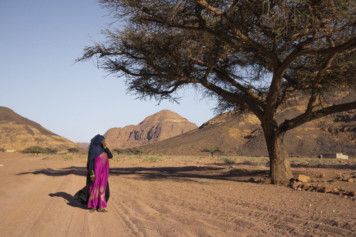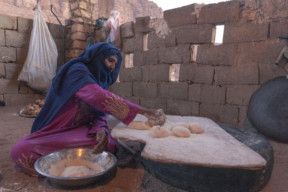
Cairo: As Umm Yasser reeled off her household chores collect wood, cook, make bread, shepherd goats she stopped to say why she decided to also lead trail hikes through the mountains of Egypt’s Sinai Peninsula.
“Normally, a woman’s role is to take care of the household, family and children,” Umm Yasser, a Bedouin member of the Hamada tribe, said recently. “Hiking is the first time I earned an income.”
Umm Yasser, whose name means “mother of Yasser” and per tradition is known by her son’s name, this year became the first woman to sign on as a guide on the Bedouin-led hiking initiative along the Sinai Trail, until recently Egypt’s only long-distance hiking route. It’s run by eight tribes in the region.
She tested traditional gender norms among Bedouin of the peninsula – who have a long history of escorting travellers and pilgrims through the Sinai – when she led her first group of hikers in April at age 47, and has every intention of picking up where she left off.
Autumn brings the start of another hiking season, which generally runs through spring, and head trail guides can make roughly the equivalent of $40 per day showing tourists how to navigate the area.
The trail, which aims to help the tribes by attracting tourism money to the region despite Egypt’s political turmoil in recent years, covers more than 345km and can take six weeks to complete. During the 2018-2019 hiking season, the trail raised the equivalent of about $60,000.
Umm Yasser and three other women from the Hamada – one of the area’s most impoverished and smallest tribes, with about 1,500 to 2,000 people – showed the potential for more financial gain by leading the first Sinai Trail trip guided by women.
The two-day trip in April was restricted to female tourists, with a special agreement on that occasion for some male journalists to attend. The 16 female hikers and six journalists were not permitted to camp overnight in the wilderness and returned to their village before sunset. Still, it marked a milestone.
“The other tribes had objected before the trip because they thought it’s shameful for women to walk with tourists,” Umm Yasser said at the family home. “I don’t think it’s shameful so I’m not concerned. I believe what I’m doing is right because work is a good thing.”
As she talked, her husband, Ebrahim Ebeid Saeed, a big supporter of his wife’s accomplishments, walked past several times, beaming. The couple’s adult son and teenage daughter, Umm Yasser’s sister and children from the village sat on the ground of the sandy courtyard.
Life in the valley is slow and simple. The stunning, rugged mountains surrounding the area mean there’s no phone signal and often the only noises are those of goats, dogs or chickens.
Umm Yasser and her family live in a square-brick home with a corrugated-metal roof. The five-room home is void of furniture or bedrooms. They sleep anywhere on the floor, including in the courtyard.

Umm Yasser, and to some degree her husband for openly encouraging her, are considered trailblazers for Bedouins. Her experience as a guide actually started in 2015, when she first hiked with British trail developer and Sinai Trail co-founder Ben Hoffler, at the suggestion of her husband.
Hoffler, who has known the couple since 2011, began visiting them more frequently after 2014 to scout routes for the Sinai Trail with Saeed, each time staying with them in their home. Saeed suggested that Hoffler try Umm Yasser as a guide, leaving the developer stunned.
“As far as I was concerned, walking with a Bedouin woman was off-limits,” Hoffler said. “When he mentioned it, I wasn’t even sure he was serious.”
Umm Yasser started to walk with Hoffler, initially accompanied by her son and then other small boys from the village, earning her first income as a guide.
“She was obviously a mountain person. Even with flimsy sneakers she was quick on difficult trails,” Hoffler said. “She was tough. And she was proud of being tough.”
When the Sinai Trail extended to Hamada lands last year, Umm Yasser, Saeed and Hoffler discussed the possibility of her becoming a guide on it. Saeed was already a head guide and represented the Hamada on the Bedouin cooperative managing the Sinai Trail. He discussed the idea with the other tribes while Umm Yasser found a few other women willing to get involved, including her sister.
“When people of other tribes objected I didn’t care because it’s not the same here,” Saeed said. “Their lands may be more open or interconnected, but ours is secluded, so it’s safe. The women can go off and won’t encounter men from other tribes.”
His fellow Hamada tribesmen don’t object, he said, “because in this tribe women shepherd goats into the mountains on their own, so it’s similar to hiking with women.”
Umm Yasser and other women in the tribe have the potential to inspire others into employment, said Hilary Gilbert, chairwoman of the South Sinai Foundation and a former research fellow at the University of Nottingham in the United Kingdom.
“To provide active role models for Bedouin girls is incredibly important, as it will give them choices about what sort of life they want to lead,” she said. “Once their families can see that they can work safely and respectably, without compromising their reputation, more girls will hopefully be allowed to work, in this and other areas.”
Umm Yasser expects to lead solo trips, including mixed groups possibly with outdoor overnight stays. She also expects to co-guide a mixed-group with her husband involving overnight camping.
“I feel very proud,” she said.
-LAT












